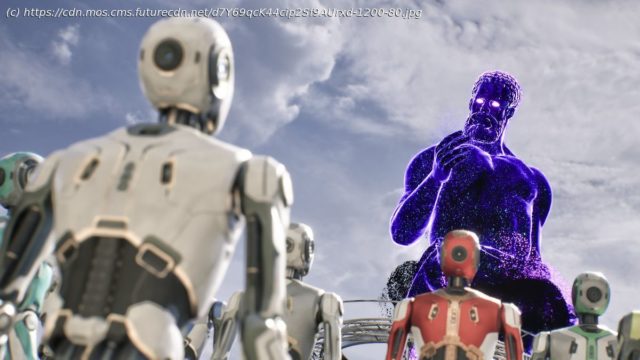The Talos Principle 2 brings fresh human context to its beautiful world of puzzles.
A good puzzle game is a compelling collection of brainteasers, but a great puzzle game provides compelling context to drive the player forward. The original Talos Principle balanced its Portal-esque first-person puzzles with philosophical introspection, examining what defines humanity, and quizzing the player on what they think, too. Its sequel confidently builds on its puzzle mechanics, but turns its narrative outwards, asking both the player and its own world: « What is a civilization? » The answer, I think, is « something beautiful ».
For those skipping the first Talos Principle (still a great game, especially in VR), humanity is donezo, wiped out by a deadly virus. Before the curtains fell on us, scientists created a simulation to cultivate a new, synthetic human race through philosophical and puzzle-based testing. Think Portal, but with less malevolent AI, and more multi-choice quizzes on fundamental humanity. The first game ended as you emerged from this simulation as the first Human 2.0. In this sequel, you’re the thousandth, beginning with your ‘birth’ into the real world.
While the first game was primarily focused on puzzle-solving and used its multi-choice philosophical quizzing as framing, Talos 2 hits around an even split, bringing the narrative to the forefront. The first game would strain to support that, being a lonely, solipsistic adventure, but here it works as there’s a whole civilization of robo-people wandering around to chat with and debate via quaint forum discussions or face-to-face. More human than human
They might have metal bodies, but the cast are every bit as cantankerous, contradictory, charming and cat-loving as flesh-humans, all well-voiced and written. Their philosophical quandaries tend to be grounded in real-world problems. Is it ethical for civilization to grow when humans previously damaged the world so badly? Is the pursuit of progress an inherently positive goal? Just how many (mechanical) humans is enough? There’s no easy or even right answers, but the game wants to hear your thoughts anyway, and while many of the conversations are optional, I found almost all of the dialogue and debate to be deeply compelling and fully worthwhile.
But, this being a puzzle adventure game and not just a chat about philosophy, there are pressing questions presented by a mysterious megastructure that’s been discovered on a remote island, namely what its presence means for their nascent robot civilization.






